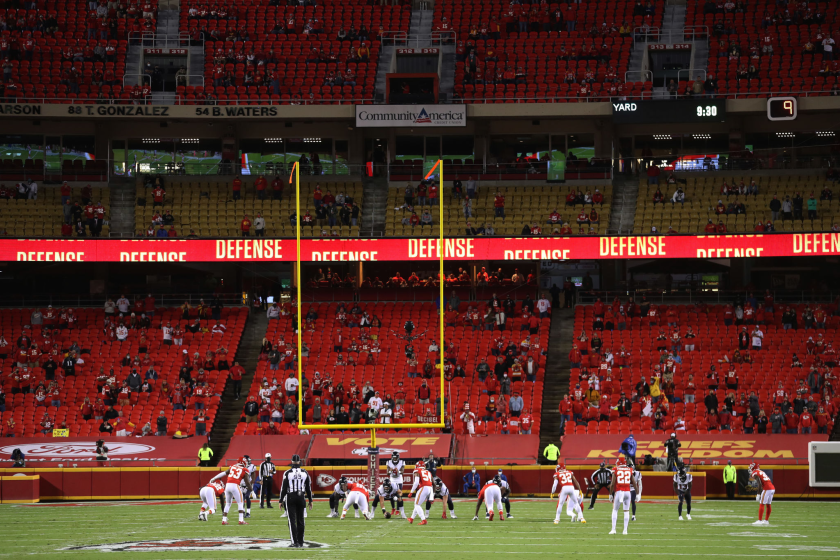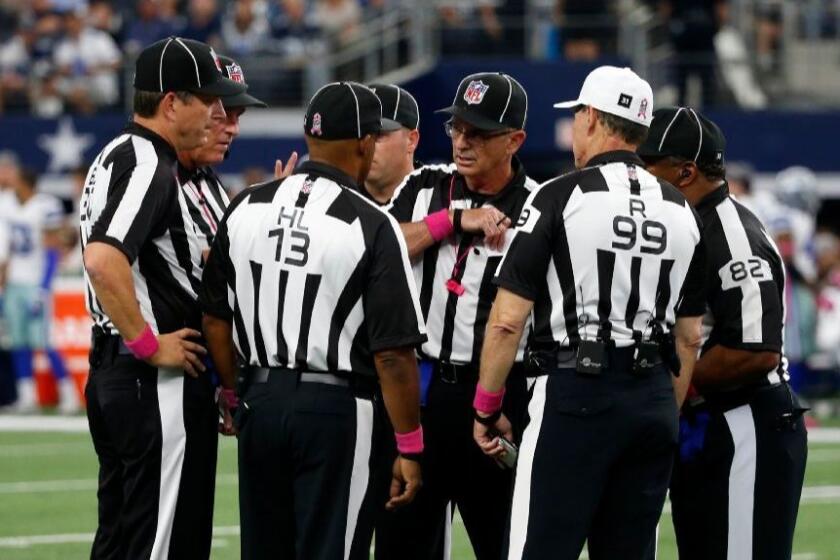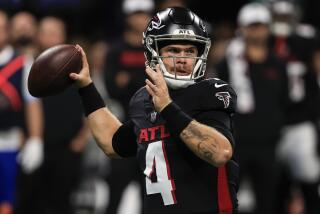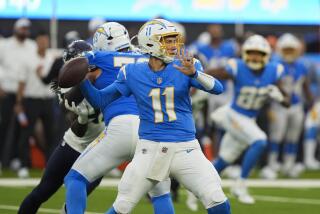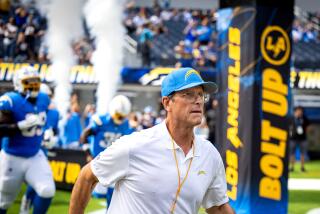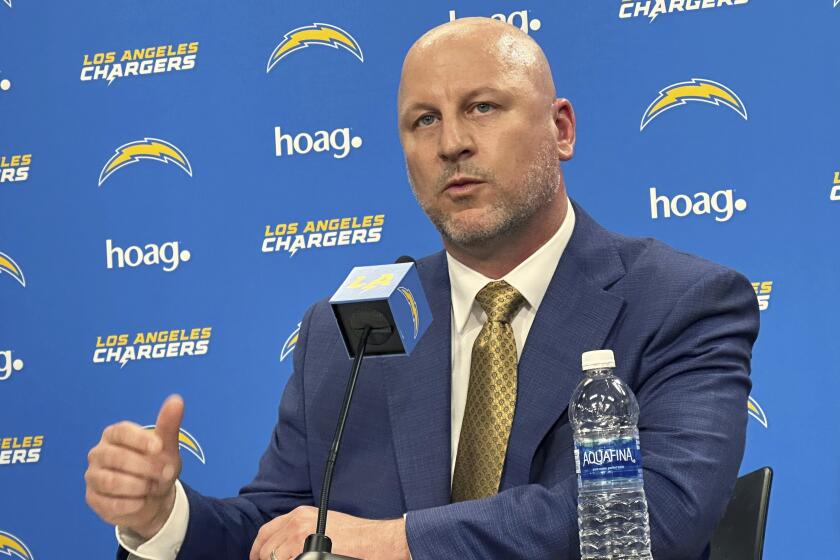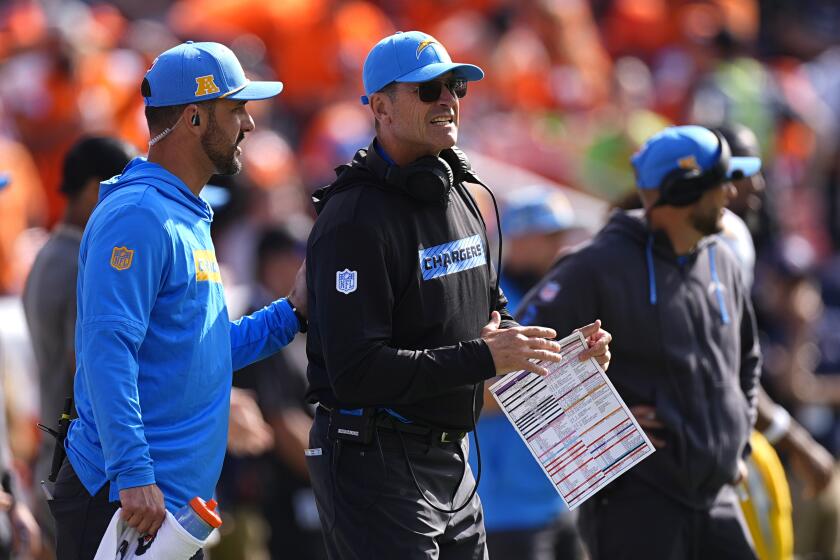New NFL practice squads aren’t perfect, but they help. Just ask the Chargers
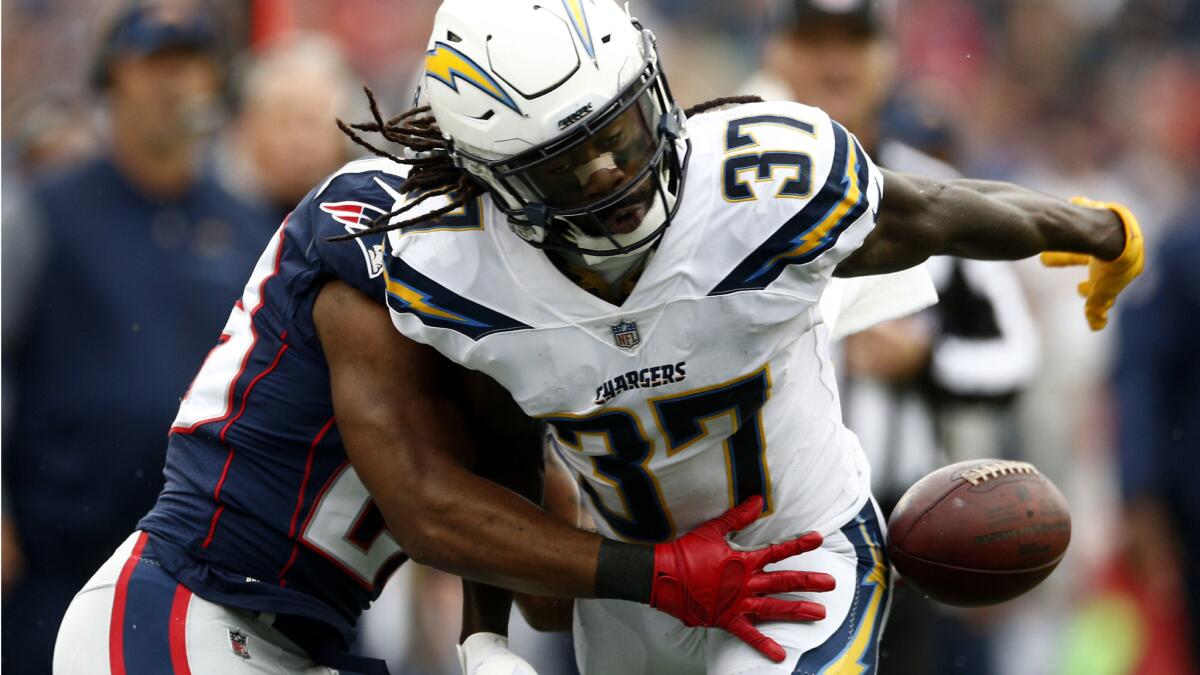
Jahleel Addae understood the circumstances when he signed up.
The free-agent safety was in the middle of a training session when his phone rang. The Chargers, already two games deep into the season, were on the other end, asking whether he’d be interested in a visit.
Within days, Addae rejoined the team that signed him as an undrafted free agent seven years ago.
The agreement, however, came with a caveat. The Chargers immediately relegated the 30-year-old veteran to the practice squad, the unit generally reserved for developmental players.
But for Addae, it was a foot back in the door.
“Going into year eight, I still have to earn my keep, and if I have to do that, then I’m willing to,” Addae said.
If Addae’s episode sounds odd, it’s because it is. But in an unprecedented season affected by the COVID-19 pandemic, the NFL and the NFL Players Assn. turned to unprecedented avenues to solve potential problems.
With two games already postponed because of positive coronavirus tests, the NFL could benefit from expanding the season to an 18th week.
In March, the league and the players’ union collectively bargained a new contract that, among other things, increased the amount of practice-squad players from 10 per team to 12 for the 2020 and 2021 seasons.
Then the COVID-19 outbreak struck. Two key questions arose amid the uncertainty: What happens when players become infected and miss games? And, without a preseason, will players be more susceptible to injuries?
The NFL and the NFLPA addressed the practice squad for those concerns when negotiating COVID-19 protocols. With that came a host of changes that will last through at least the 2020 season.
Practice squads now can carry 16 players. Six can be veterans, defined as players with more than two accrued seasons (a season with six or more games on a full-pay status). The original collective bargaining agreement allowed for two such players. In the 2020 season, veterans earn a $12,000 weekly salary, while others earn $8,400 a week.
Teams now can carry 55 players on the active roster — a two-person increase — if they elevate two practice-squad players the day before a game.
And if a team suddenly learns a player tests positive or must quarantine, it can elevate a practice-squad player up to 90 minutes before a game. Teams must sign a player to the active roster if they elevate him for two games.
Because of the laundry list of injuries the Chargers have suffered through four weeks, coach Anthony Lynn said he is thankful for the new protocols.
“I tell you what, man, the league saw this coming,” he said.
Scoring is up in the NFL, and that could be because penalties are down. Entering Week 4, there had been an average of 13.65 penalties per game this season, down from 18.54 through the same stretch last season.
For Addae, the move made sense. The Central Michigan product started 58 games for the Chargers over six seasons before the team released him in March 2019. He joined the Houston Texans last season, recording 45 combined tackles and a career-high two interceptions.
But the Texans released him and workouts with the Las Vegas Raiders and Minnesota Vikings were unfruitful.
Since his return, Addae played special teams for the Chargers in the Week 3 loss to the Carolina Panthers amid an injury-riddled defensive backfield but was listed inactive Sunday against the Tampa Bay Buccaneers.
Addae said his stint on the practice squad reacclimated him to the team after a strange offseason and he believes the new rule is beneficial.
“With no real training camp and no OTAs (organized team activities), it gives guys time to come in, get their feet wet, learn the playbook and, whenever they’re ready, to get pulled up,” Addae said.
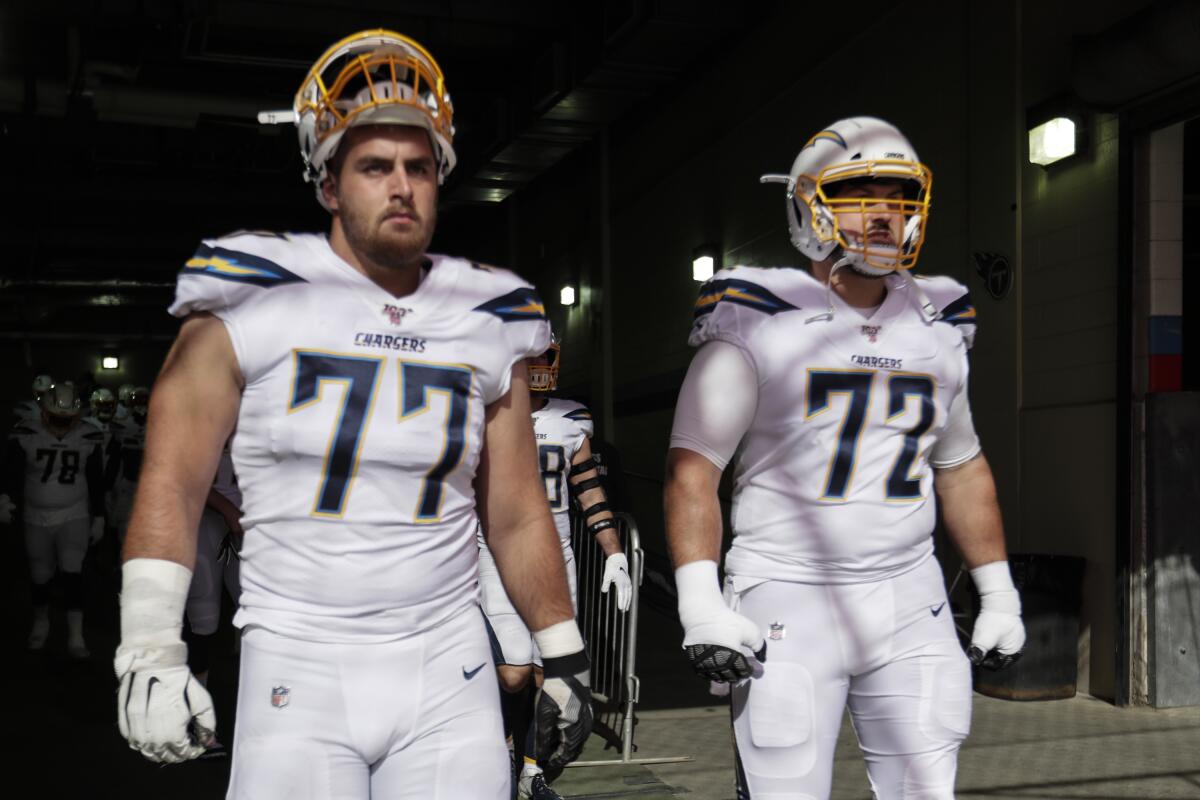
Unlike Addae, offensive lineman Ryan Groy participated with the Chargers from the start of training camp. The 30-year-old veteran said making the practice squad relieved him, as it was a better alternative to not playing at all.
But some parts of the process still frustrated him, he said.
Typically, a practice-squad player can be signed by other teams if placed on the active roster. But COVID-19 protocols allow teams to select up to four players per week they can protect from competitors, an option the Chargers exercised with Groy, who is in his second year with the team.
He since has been signed to the active roster because the offensive line has been depleted by injuries to right guard Trai Turner (groin), right tackle Bryan Bulaga (back) and center Mike Pouncey, whose hip injury has sidelined him for the season.
Groy said he’s glad to be a starter after a rough training camp.
“I mean, I didn’t like it, obviously,” said Groy, who is in his seventh NFL season and had previous stops with the Buffalo Bills and Chicago Bears. “As a veteran, it’s tough to tell me I’m locked in to the practice squad. But I understand why it happened, and you just got to roll with it and do what you can do week to week.”
Lynn agreed, saying, as a veteran, Groy easily could have refused his role. But he persevered, and Lynn said he’s happy the lineman chose to stay.
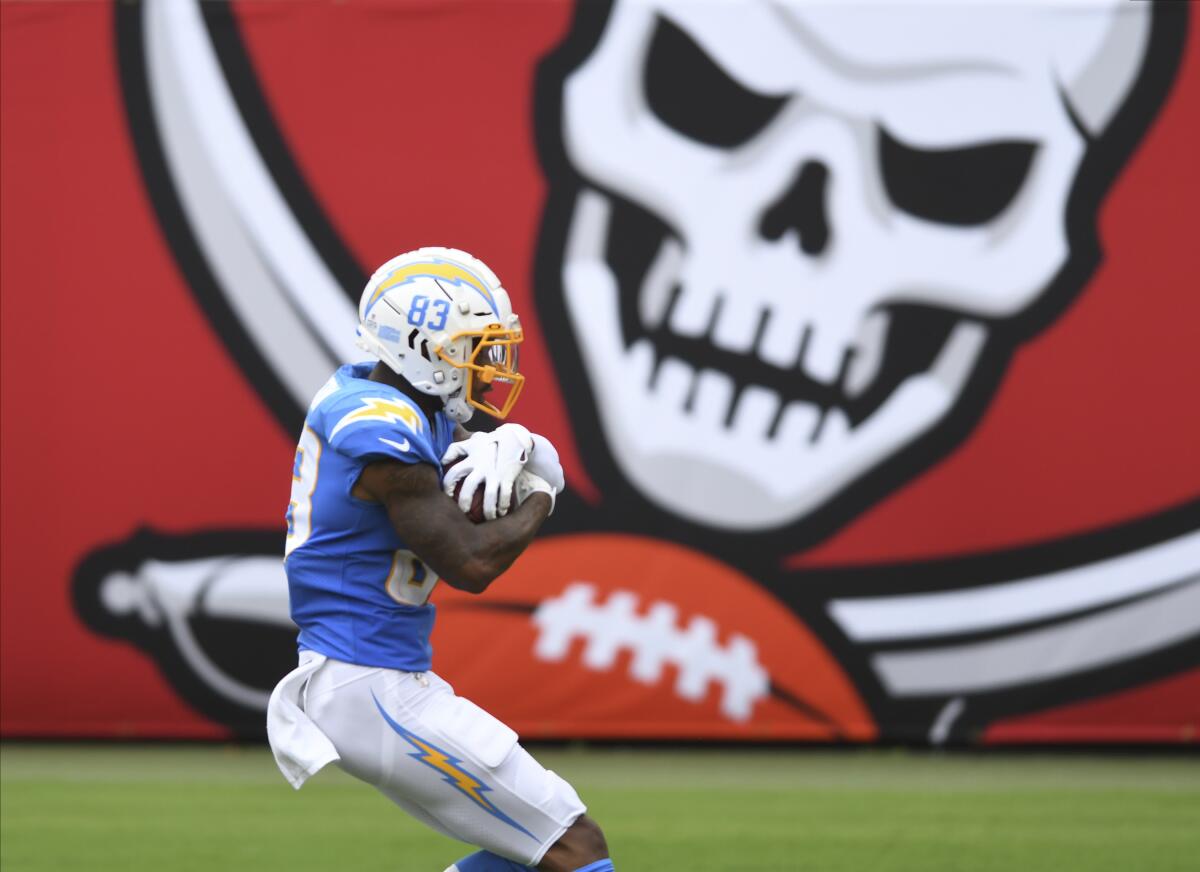
For younger players and veterans, the practice squad is of bigger importance this season, Chargers general manager Tom Telesco said. On Sunday, a day after wide receiver Tyron Johnson had been activated to the active roster, he scored on a 53-yard touchdown grab against the Buccaneers.
It was his first NFL reception after going undrafted a year ago and spending last season on the practice squad with four different teams, including the Chargers. His performance impressed teammates, with star receiver Keenan Allen saying he believed Johnson should have been on the active roster earlier.
Lynn said Johnson took his work ethic to a “whole other level” during the week in meetings and came to the Lynn’s office at 5:45 a.m. on Friday asking whether he could play.
“I was going to bring you up anyway because of what you have been doing,” Lynn recalled telling him. “And then I brought him up and he made a play, so that’s good for him.”
Telesco said everyone needs to stay prepared.
“Those guys all have to be ready, and we have to coach them up like they all have to be ready, and that’s not easy,” he said.
“They’re going to earn their money. I can tell you that.”
More to Read
Go beyond the scoreboard
Get the latest on L.A.'s teams in the daily Sports Report newsletter.
You may occasionally receive promotional content from the Los Angeles Times.
